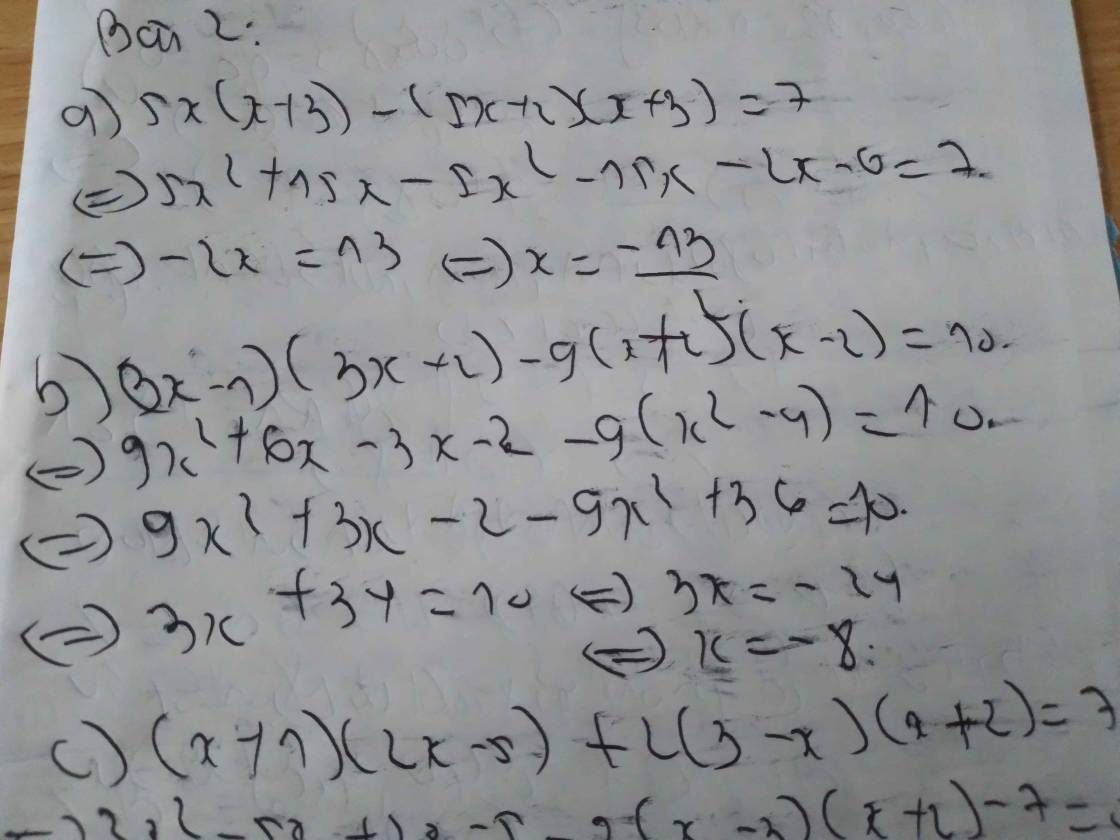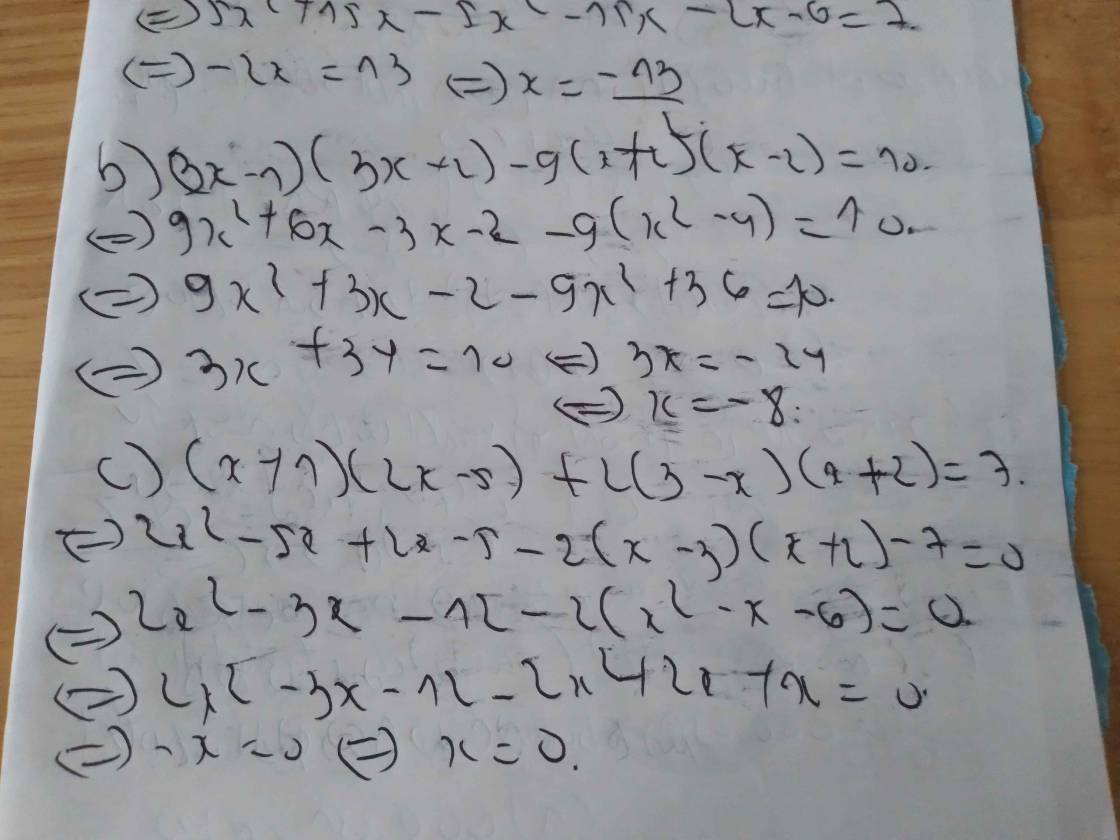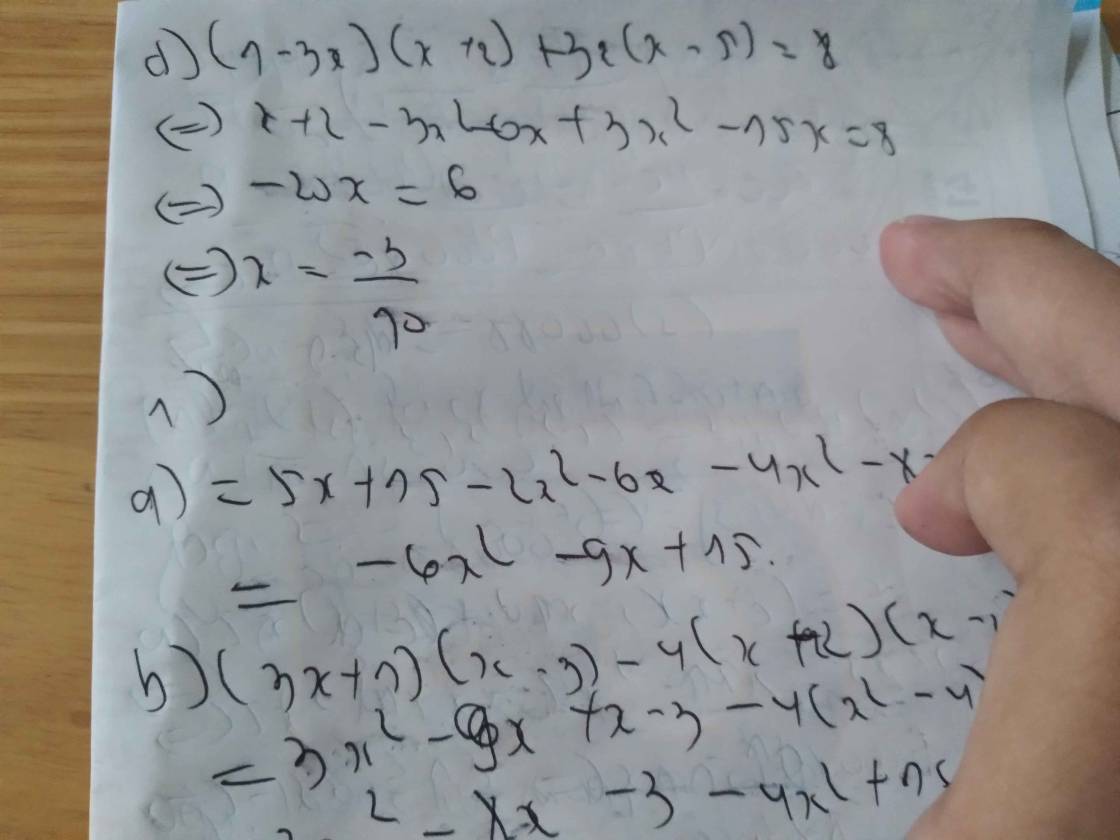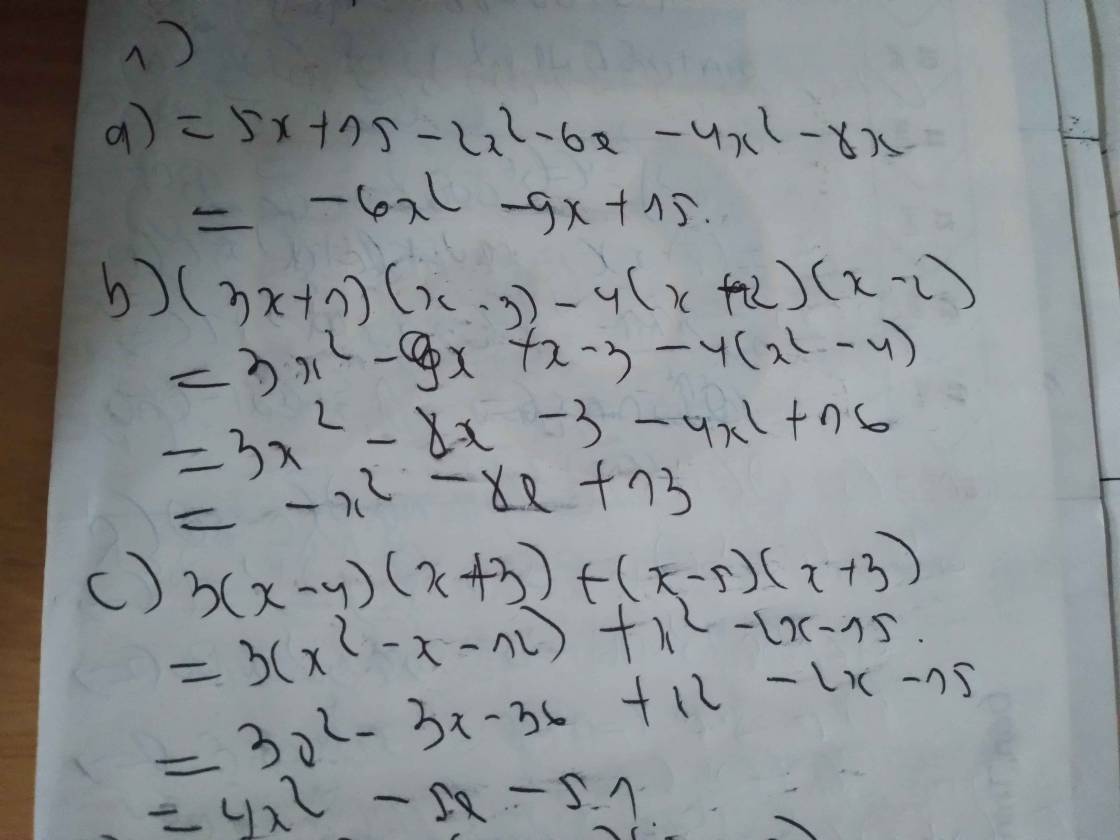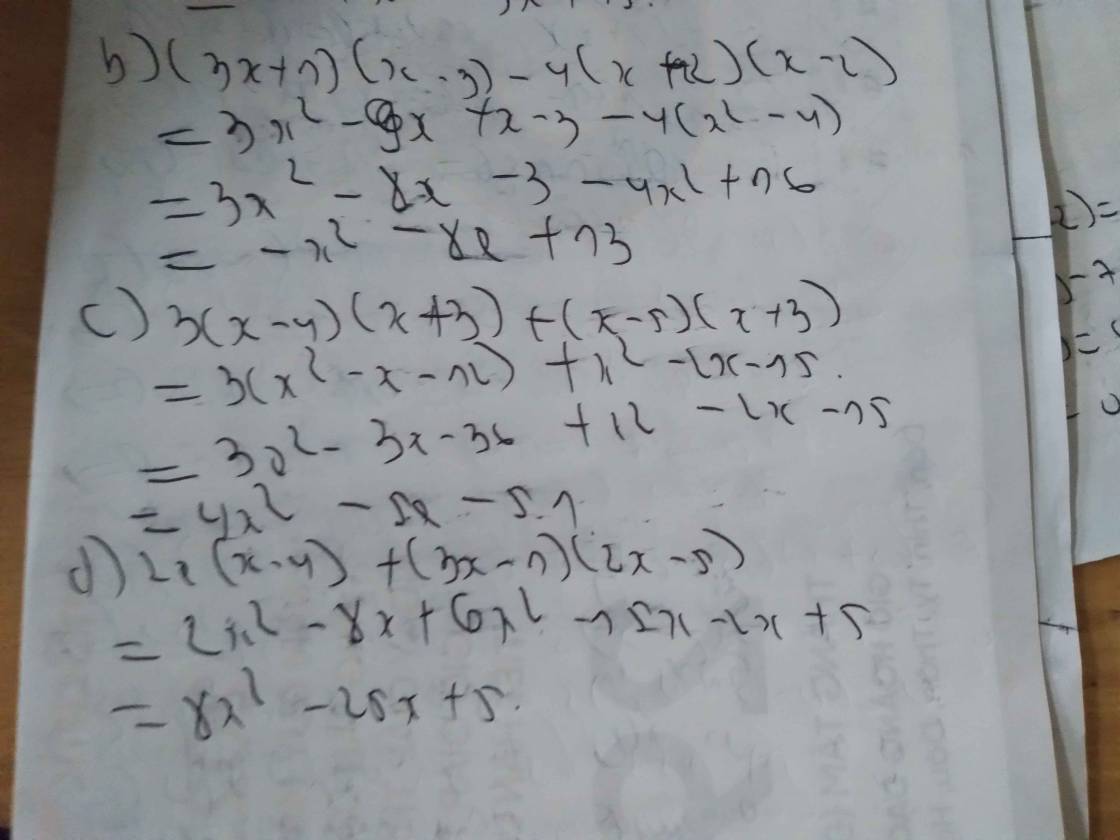(x^4-x^3+2x^2-x+3x) (x^2+1)

Những câu hỏi liên quan
Rút gọn :
1. (2x-5)(3x+1)-(x-3)^2+(2x+5)^2-(3x+1)^3
2. (2x-1)(2x+1)-3x-2)(2x+3)-(x-1)^3+(2x+3)^3
3. (x-2)(x^2+2x+4)-(3x-2)^3+(3x-4)^2
4. (7x-1)(8x+2)-(2x-7)^2-(x-4)^3-(3x+1)^3
5. (5x-1)(5x+1)-(x+3)(x^2-3x+9)-(2x+4)^2-(3x-4)^2+(2x-5)^3
6. (4x-1)(x+2)-(2x+5)^2-(3x-7)^2+(2x+3)^3=(3x-1)^3
1: \(=6x^2+2x-15x-5-x^2+6x-9+4x^2+20x+25-27x^3-27x^2-9x-1\)
=-27x^3-18x^2+4x+10
2: =4x^2-1-6x^2-9x+4x+6-x^3+3x^2-3x+1+8x^3+36x^2+54x+27
=7x^3+37x^2+46x+33
5:
\(=25x^2-1-x^3-27-4x^2-16x-16-9x^2+24x-16+\left(2x-5\right)^3\)
\(=8x^3-60x^2+150-125+12x^2-x^3+8x-60\)
=7x^3-48x^2+8x-35
Đúng 0
Bình luận (0)
1) |2x - 1| 52) |2x - 1| |x + 5|3) |3x + 1| x - 2 4) |3 - 2x| x + 2 5) |2x - 1| 5 - x 6) |- 3x| x - 2 7) |2 - 3x| 2x + 1 8) |2x - 1| + |4x ^ 2 - 1| 0 9) (2x + 5)/(x + 3) + 1 4/(x ^ 2 + 2x - 3) - (3x - 1)/(1 - x) 10) (x - 1)/(x + 3) - x/(x - 3) (7x - 3)/(9 - x ^ 2) 11) 5 + 96/(x ^ 2 - 16) (2x - 1)/(x + 4) + (3x - 1)/(x - 4) 12) (2x)/(2x - 1) + x/(2x + 1) 1 + 4/((2x - 1)(2x + 1)) 13) (x + 2)/(x - 2) - 1/x 2/(x ^ 2 - 2x) 14) x/(2x - 6) + x/(2x + 2) (2x + 4)/(x ^ 2 - 2x - 3)
Đọc tiếp
1) |2x - 1| = 5
2) |2x - 1| = |x + 5|
3) |3x + 1| = x - 2
4) |3 - 2x| = x + 2
5) |2x - 1| = 5 - x
6) |- 3x| = x - 2
7) |2 - 3x| = 2x + 1
8) |2x - 1| + |4x ^ 2 - 1| = 0
9) (2x + 5)/(x + 3) + 1 = 4/(x ^ 2 + 2x - 3) - (3x - 1)/(1 - x)
10) (x - 1)/(x + 3) - x/(x - 3) = (7x - 3)/(9 - x ^ 2)
11) 5 + 96/(x ^ 2 - 16) = (2x - 1)/(x + 4) + (3x - 1)/(x - 4)
12) (2x)/(2x - 1) + x/(2x + 1) = 1 + 4/((2x - 1)(2x + 1))
13) (x + 2)/(x - 2) - 1/x = 2/(x ^ 2 - 2x)
14) x/(2x - 6) + x/(2x + 2) = (2x + 4)/(x ^ 2 - 2x - 3)
Bài 1:a) x (x^2 + 2) + 2x(1-dfrac{1}{2}x^2)4 b) (2x)^2 (x – 1) + x(x^2 + 4x) 40c) 3x(x – 2) – 3(x^2 – 3) 8d) 2x^2(4x^3 + 2x) + (x^2 – 2)(- 2x)^3 20Bài 2: P 3x(dfrac{2}{3}x^2 − 3x^4) + (3x)^2 (x^3 – 1) + (- 2x + 9)x^2 - 12
Đọc tiếp
Bài 1:
a) x (\(x^2\) + 2) + 2x\((1-\dfrac{1}{2}x^2)=4\)
b) (2x)\(^2\) (x – 1) + x(\(x^2\) + 4x) = 40
c) 3x(x – 2) – 3(\(x^2\) – 3) = 8
d) 2\(x^2\)(4\(x^3\) + 2x) + (\(x^2\) – 2)(- 2x)\(^3\) = 20
Bài 2:
P = 3x(\(\dfrac{2}{3}\)\(x^2\) − \(3x^4)\) + (3x)\(^2\) (\(x^3\) – 1) + (- 2x + 9)\(x^2\) - 12
Bài 2:
Ta có: \(P=3x\left(\dfrac{2}{3}x^2-3x^4\right)+9x^2\left(x^3-1\right)+x^2\left(-2x+9\right)-12\)
\(=2x^3-9x^5+9x^5-9x^2-2x^3+9x^2-12\)
=-12
Đúng 0
Bình luận (0)
Bài 1:
a: Ta có: \(x\left(x^2+2\right)+2x\left(1-\dfrac{1}{2}x^2\right)=4\)
\(\Leftrightarrow x^3+2x+2x-x^3=4\)
hay x=1
b: Ta có: \(4x^2\left(x-1\right)+x\left(x^2+4x\right)=40\)
\(\Leftrightarrow4x^3-4x^2+x^3+4x^2=40\)
\(\Leftrightarrow5x^3=40\)
hay x=2
c: Ta có: \(3x\left(x-2\right)-3\left(x^2-3\right)=8\)
\(\Leftrightarrow3x^2-6x-3x^2+9=8\)
\(\Leftrightarrow-6x=-1\)
hay \(x=\dfrac{1}{6}\)
Đúng 0
Bình luận (0)
giải pt
a 2(x+3)(x-4)=(2x-1)(x+2)-27
b (3x+2)(x-1)-3(x+1)(x-2)=4
c (x+2)(x^2 -2x+4)-x(x-3)(x+3)=26
d (3x+2)(3x-2)-(3x-4)^2=28
e 5(x+3)^2-5(x-4)(x+8)=3x
f 2x(x+2)^2-8x^2=2(x-2)(x^2+2x+4)
g (2x-1)(4x^2+2x+1)-4x(2x^2-3)=23
h x(x-2)(x+2)-(x-3)(x^2+3x+9)+1=0
i x(x^2+x+1)-(x-1)(x+1)x=x^2+2
a, \(2\left(x+3\right)\left(x-4\right)=\left(2x-1\right)\left(x+2\right)-27\)
\(\Leftrightarrow2\left(x^2-4x+3x-12\right)=2x^2+4x-x-2-27\)
\(\Leftrightarrow2x^2-2x-24=2x^2+3x-29\Leftrightarrow-5x+5=0\Leftrightarrow x=1\)
b, \(\left(x+2\right)\left(x^2-2x+4\right)-x\left(x-3\right)\left(x+3\right)=26\)
\(\Leftrightarrow x^3-8-x\left(x^2-9\right)=26\Leftrightarrow-8+9x=26\)
\(\Leftrightarrow9x=18\Leftrightarrow x=2\)
Bài 1:Thực hiện phép tính
a,(5-2x)(x+3)-4x(x+2) b,(3x+1)(x-3)-4(x+2)(x-2)
c,3(x-4)(x+3)+(x-5)(x+3) d,2x(x-4)+(3x-1)(2x-5)
Bài 2:Tìm x biết
a,5x(x+3)-(5x+2)(x+3)=7
b,(3x-1)(3x+2)-9(x+2)(x-2)=10
c,(x+1)(2x-5)+2(3-x)(x+2)=7
d,(1-3x)(x+2)+3x(x-5)=8
4) |3 - 2x| x + 2 5) |2x - 1| 5 - x6) |- 3x| x - 27) |2 - 3x| 2x + 18) |2x - 1| + |4x ^ 2 - 1| 09) (2x + 5)/(x + 3) + 1 4/(x ^ 2 + 2x - 3) - (3x - 1)/(1 - x)10) (x - 1)/(x + 3) - x/(x - 3) (7x - 3)/(9 - x ^ 2)11) 5 + 96/(x ^ 2 - 16) (2x - 1)/(x + 4) + (3x - 1)/(x - 4)12) (2x)/(2x - 1) + x/(2x + 1) 1 + 4/((2x - 1)(2x + 1))13) (x + 2)/(x - 2) - 1/x 2/(x ^ 2 - 2x)14) x/(2x - 6) + x/(2x + 2) (2x + 4)/(x ^ 2 - 2x - 3)
Đọc tiếp
4) |3 - 2x| = x + 2
5) |2x - 1| = 5 - x
6) |- 3x| = x - 2
7) |2 - 3x| = 2x + 1
8) |2x - 1| + |4x ^ 2 - 1| = 0
9) (2x + 5)/(x + 3) + 1 = 4/(x ^ 2 + 2x - 3) - (3x - 1)/(1 - x)
10) (x - 1)/(x + 3) - x/(x - 3) = (7x - 3)/(9 - x ^ 2)
11) 5 + 96/(x ^ 2 - 16) = (2x - 1)/(x + 4) + (3x - 1)/(x - 4)
12) (2x)/(2x - 1) + x/(2x + 1) = 1 + 4/((2x - 1)(2x + 1))
13) (x + 2)/(x - 2) - 1/x = 2/(x ^ 2 - 2x)
14) x/(2x - 6) + x/(2x + 2) = (2x + 4)/(x ^ 2 - 2x - 3)
14) Ta có: \(\dfrac{x}{2x-6}+\dfrac{x}{2x+2}=\dfrac{2x+4}{x^2-2x-3}\)
\(\Leftrightarrow\dfrac{x\left(x+1\right)}{2\left(x-3\right)\left(x+1\right)}+\dfrac{x\left(x-3\right)}{2\left(x+1\right)\left(x-3\right)}=\dfrac{4x+8}{2\left(x-3\right)\left(x+1\right)}\)
Suy ra: \(x^2+x+x^2-3x-4x-8=0\)
\(\Leftrightarrow2x^2-6x-8=0\)
\(\Leftrightarrow x^2-3x-4=0\)
a=1; b=-3; c=-4
Vì a-b+c=0 nên phương trình có hai nghiệm phân biệt là:
\(x_1=-1\left(loại\right);x_2=\dfrac{-c}{a}=4\left(nhận\right)\)
Đúng 1
Bình luận (0)
4) |3 - 2x| x + 25) |2x - 1| 5 - x6) |- 3x| x - 27) |2 - 3x| 2x + 18) |2x - 1| + |4x ^ 2 - 1| 09) (2x + 5)/(x + 3) + 1 4/(x ^ 2 + 2x - 3) - (3x - 1)/(1 - x)10) (x - 1)/(x + 3) - x/(x - 3) (7x - 3)/(9 - x ^ 2)11) 5 + 96/(x ^ 2 - 16) (2x - 1)/(x + 4) + (3x - 1)/(x - 4)12) (2x)/(2x - 1) + x/(2x + 1) 1 + 4/((2x - 1)(2x + 1))13) (x + 2)/(x - 2) - 1/x 2/(x ^ 2 - 2x)14) x/(2x - 6) + x/(2x + 2) (2x + 4)/(x ^ 2 - 2x - 3)
Đọc tiếp
4) |3 - 2x| = x + 2
5) |2x - 1| = 5 - x
6) |- 3x| = x - 2
7) |2 - 3x| = 2x + 1
8) |2x - 1| + |4x ^ 2 - 1| = 0
9) (2x + 5)/(x + 3) + 1 = 4/(x ^ 2 + 2x - 3) - (3x - 1)/(1 - x)
10) (x - 1)/(x + 3) - x/(x - 3) = (7x - 3)/(9 - x ^ 2)
11) 5 + 96/(x ^ 2 - 16) = (2x - 1)/(x + 4) + (3x - 1)/(x - 4)
12) (2x)/(2x - 1) + x/(2x + 1) = 1 + 4/((2x - 1)(2x + 1))
13) (x + 2)/(x - 2) - 1/x = 2/(x ^ 2 - 2x)
14) x/(2x - 6) + x/(2x + 2) = (2x + 4)/(x ^ 2 - 2x - 3)
9) Ta có: \(\dfrac{2x+5}{x+3}+1=\dfrac{4}{x^2+2x-3}-\dfrac{3x-1}{1-x}\)
\(\Leftrightarrow\left(2x+5\right)\left(x-1\right)+x^2+2x-3=4+\left(3x-1\right)\left(x+3\right)\)
\(\Leftrightarrow2x^2-2x+5x-5+x^2+2x-3-4-3x^2-10x+x+3=0\)
\(\Leftrightarrow-4x=9\)
hay \(x=-\dfrac{9}{4}\)
Đúng 1
Bình luận (0)
10) Ta có: \(\dfrac{x-1}{x+3}-\dfrac{x}{x-3}=\dfrac{7x-3}{9-x^2}\)
\(\Leftrightarrow\dfrac{\left(x-1\right)\left(x-3\right)}{\left(x+3\right)\left(x-3\right)}-\dfrac{x\left(x+3\right)}{\left(x-3\right)\left(x+3\right)}=\dfrac{3-7x}{\left(x-3\right)\left(x+3\right)}\)
Suy ra: \(x^2-4x+3-x^2-3x-3+7x=0\)
\(\Leftrightarrow0x=0\)(luôn đúng)
Vậy: S={x|\(x\notin\left\{3;-3\right\}\)}
11) Ta có: \(\dfrac{5+9x}{x^2-16}=\dfrac{2x-1}{x+4}+\dfrac{3x-1}{x-4}\)
\(\Leftrightarrow\dfrac{\left(2x-1\right)\left(x-4\right)}{\left(x-4\right)\left(x+4\right)}+\dfrac{\left(3x-1\right)\left(x+4\right)}{\left(x-4\right)\left(x+4\right)}=\dfrac{9x+5}{\left(x-4\right)\left(x+5\right)}\)
Suy ra: \(2x^2-9x+4+3x^2+12x-x-4-9x-5=0\)
\(\Leftrightarrow5x^2-7x=0\)
\(\Leftrightarrow x\left(5x-7\right)=0\)
\(\Leftrightarrow\left[{}\begin{matrix}x=0\\x=\dfrac{7}{5}\end{matrix}\right.\)
12) Ta có: \(\dfrac{2x}{2x-1}+\dfrac{x}{2x+1}=1+\dfrac{4}{\left(2x-1\right)\left(2x+1\right)}\)
\(\Leftrightarrow\dfrac{2x\left(2x+1\right)}{\left(2x-1\right)\left(2x+1\right)}+\dfrac{x\left(2x-1\right)}{\left(2x+1\right)\left(2x-1\right)}=\dfrac{4x^2-1+4}{\left(2x-1\right)\left(2x+1\right)}\)
Suy ra: \(4x^2+2x+2x^2-x-4x^2-3=0\)
\(\Leftrightarrow2x^2+x-3=0\)
\(\Leftrightarrow2x^2+3x-2x-3=0\)
\(\Leftrightarrow\left(2x+3\right)\left(x-1\right)=0\)
\(\Leftrightarrow\left[{}\begin{matrix}x=-\dfrac{3}{2}\\x=1\end{matrix}\right.\)
Đúng 1
Bình luận (0)
13) Ta có: \(\dfrac{x+2}{x-2}-\dfrac{1}{x}=\dfrac{2}{x^2-2x}\)
\(\Leftrightarrow\dfrac{x\left(x+2\right)}{x\left(x-2\right)}-\dfrac{x-2}{x\left(x-2\right)}=\dfrac{2}{x\left(x-2\right)}\)
Suy ra: \(x^2+2x-x+2-2=0\)
\(\Leftrightarrow x^2+x=0\)
\(\Leftrightarrow x\left(x+1\right)=0\)
\(\Leftrightarrow\left[{}\begin{matrix}x=0\left(loại\right)\\x=-1\left(nhận\right)\end{matrix}\right.\)
Đúng 1
Bình luận (0)
Xem thêm câu trả lời
1: 3/x+1 + 2/x+2 = 5x+4/x2+ 3x + 2
2: 2/3x + 1 - 15/6x2-x-1 = 3/2x - 1
3: 9/3x - 1 - 5-x/3x2-4x+1 = 4/x+ 1
4:5/x - 2 + 2/x+4 = 3x/x2 + 2x - 8
5: 4/x+6 + 1/x - 3 = 9/x2 + 3x - 18
6:x/x-3 - 2x2 +9/2x2 - 3x - 9= 1/2x + 3
\(\frac{3}{x+1}+\frac{2}{x+2}=\frac{5x+4}{x^2+3x+2}.\)ĐKXĐ: \(x\ne-1;-2\)
\(\Leftrightarrow\frac{3\left(x+2\right)}{\left(x+1\right)\left(x+2\right)}+\frac{2\left(x+1\right)}{\left(x+1\right)\left(x+2\right)}=\frac{5x+4}{\left(x+1\right)\left(x+2\right)}\)
\(\Leftrightarrow3x+6+2x+2=5x+4\)
\(\Leftrightarrow3x+2x-5x=-6-2+4\)
\(\Leftrightarrow0x=-4\)
=> PT vô nghiệm
\(2;\frac{2}{3x-1}-\frac{15}{6x^2-x-1}=\frac{3}{2x-1}\)
\(\Leftrightarrow\frac{2\left(2x-1\right)}{\left(2x-1\right)\left(3x-1\right)}-\frac{15}{6x^2+3x-2x-1}=\frac{3\left(3x-1\right)}{\left(2x-1\right)\left(3x-1\right)}\)
\(\Leftrightarrow\frac{4x-2-15}{\left(2x-1\right)\left(3x-1\right)}=\frac{9x-3}{\left(2x-1\right)\left(3x-1\right)}\)
\(\Leftrightarrow4x-2-15=9x-3\)
\(\Leftrightarrow4x-9x=2+15-3\)
\(\Leftrightarrow-5x=14\)
.....
Đúng 0
Bình luận (0)
mấy cái này mẫu nào dài cậu phân tích ra :
VD : câu 3 : \(3x^2-4x+1\)
\(=3x^2-3x-x+1\)
\(=3x\left(x-1\right)-\left(x-1\right)\)
\(=\left(3x-1\right)\left(x-1\right)\)
r bắt đầu giải PHương trình :)) Mấy câu còn lại tương tự
Đúng 0
Bình luận (0)
4; \(\frac{5}{x-2}+\frac{2}{x+4}=\frac{3x}{x^2+2x-8}.\)
\(\Leftrightarrow\frac{5\left(x+4\right)}{\left(x-2\right)\left(x+4\right)}+\frac{2\left(x-2\right)}{\left(x-2\right)\left(x+4\right)}=\frac{3x}{\left(x-2\right)\left(x+4\right)}\)
\(\Leftrightarrow5x+20+2x-4=3x\)
\(\Leftrightarrow4x=-16\Leftrightarrow x=-2\left(TM\right)\)
KL ::
\(5;\frac{4}{x+6}+\frac{1}{x-3}=\frac{9}{x^2+3x-18}\)
\(\Leftrightarrow\frac{4\left(x-3\right)}{\left(x+6\right)\left(x-3\right)}+\frac{x+6}{\left(x-3\right)\left(x+6\right)}=\frac{9}{\left(x-3\right)\left(x+6\right)}\)
\(\Leftrightarrow4x+x=3+9-6\)
\(\Leftrightarrow5x=6\Leftrightarrow x=\frac{6}{5}\)
Đúng 0
Bình luận (0)
Xem thêm câu trả lời
Bài 4: Tìm x, biết:
a) 3(2x – 3) + 2(2 – x) = –3 ; b) x(5 – 2x) + 2x(x – 1) = 13 ;
c) 5x(x – 1) – (x + 2)(5x – 7) = 6 ; d) 3x(2x + 3) – (2x + 5)(3x – 2) = 8 ;
e) 2(5x – 8) – 3(4x – 5) = 4(3x – 4) + 11; f) 2x(6x – 2x 2 ) + 3x 2 (x – 4) = 8.
\(a,3\left(2x-3\right)+2\left(2-x\right)=-3\\ \Leftrightarrow6x-9+4-2x=-3\\ \Leftrightarrow4x=2\\ \Leftrightarrow x=\dfrac{1}{2}\\ b,x\left(5-2x\right)+2x\left(x-1\right)=13\\ \Leftrightarrow5x-2x^2+2x^2-2x=13\\ \Leftrightarrow3x=13\\ \Leftrightarrow x=\dfrac{13}{3}\\ c,5x\left(x-1\right)-\left(x+2\right)\left(5x-7\right)=6\\ \Leftrightarrow5x^2-5x-5x^2-3x+14=6\\ \Leftrightarrow-8x=-8\\ \Leftrightarrow x=1\\ d,3x\left(2x+3\right)-\left(2x+5\right)\left(3x-2\right)=8\\ \Leftrightarrow6x^2+9x-6x^2-11x+10=8\\ \Leftrightarrow-2x=-2\\ \Leftrightarrow x=1\)
\(e,2\left(5x-8\right)-3\left(4x-5\right)=4\left(3x-4\right)+11\\ \Leftrightarrow10x-16-12x+15=12x-16+11\\ \Leftrightarrow-14x=-4\\ \Leftrightarrow x=\dfrac{2}{7}\\ f,2x\left(6x-2x^2\right)+3x^2\left(x-4\right)=8\\ \Leftrightarrow12x^2-4x^3+3x^3-12x^2=8\\ \Leftrightarrow-x^3-8=0\\ \Leftrightarrow-\left(x^3+8\right)=0\\ \Leftrightarrow-\left(x+2\right)\left(x^2-2x+4\right)=0\\ \Leftrightarrow\left[{}\begin{matrix}x=-2\\x\in\varnothing\left(x^2-2x+4=\left(x-1\right)^2+3>0\right)\end{matrix}\right.\)
Đúng 3
Bình luận (0)
Bài 4:
a: Ta có: \(3\left(2x-3\right)-2\left(x-2\right)=-3\)
\(\Leftrightarrow6x-9-2x+4=-3\)
\(\Leftrightarrow4x=2\)
hay \(x=\dfrac{1}{2}\)
b: Ta có: \(x\left(5-2x\right)+2x\left(x-1\right)=13\)
\(\Leftrightarrow5x-2x^2+2x^2-2x=13\)
\(\Leftrightarrow3x=13\)
hay \(x=\dfrac{13}{3}\)
c: Ta có: \(5x\left(x-1\right)-\left(x+2\right)\left(5x-7\right)=6\)
\(\Leftrightarrow5x^2-5x-5x^2+7x-10x+14=6\)
\(\Leftrightarrow-8x=-8\)
hay x=1
Đúng 0
Bình luận (0)
a/ \(3\left(2x-3\right)+2\left(2-x\right)=-3\)
\(\Leftrightarrow6x-9+4-2x=-3\)
\(\Leftrightarrow4x=2\)
\(\Leftrightarrow x=\dfrac{1}{2}\)
Vậy: \(x=\dfrac{1}{2}\)
===========
b/ \(x\left(5-2x\right)+2x\left(x-1\right)=13\)
\(\Leftrightarrow5x-2x^2+2x^2-2x=13\)
\(\Leftrightarrow3x=13\)
\(\Leftrightarrow x=\dfrac{13}{3}\)
Vậy: \(x=\dfrac{13}{3}\)
==========
c/ \(5x\left(x-1\right)-\left(x+2\right)\left(5x-7\right)=6\)
\(\Leftrightarrow5x^2-5x-5x^2+7x-10x+14=6\)
\(\Leftrightarrow-8x=-8\)
\(\Leftrightarrow x=1\)
Vậy: \(x=1\)
==========
d/ \(3x\left(2x+3\right)-\left(2x+5\right)\left(3x-2\right)=8\)
\(\Leftrightarrow6x^2+9x-6x^2+4x-15x+10=8\)
\(\Leftrightarrow-2x=-2\)
\(\Leftrightarrow x=1\)
Vậy: \(x=1\)
==========
e/ \(2\left(5x-8\right)-3\left(4x-5\right)=4\left(3x-4\right)+11\)
\(\Leftrightarrow10x-16-12x+15=12x-16+11\)
\(\Leftrightarrow-14x=-4\)
\(\Leftrightarrow x=\dfrac{2}{7}\)
Vậy: \(x=\dfrac{2}{7}\)
==========
f/ \(2x\left(6x-2x^2\right)+3x^2\left(x-4\right)=8\)
\(\Leftrightarrow12x^2-4x^3+3x^3-12x^2=8\)
\(\Leftrightarrow-x^3=8\)
\(\Leftrightarrow x=-2\)
Vậy: \(x=-2\)
Đúng 0
Bình luận (0)
1. Rút gọn biểu thức:
A = (x + 2)2 - (x + 3)(x - 1) + 15
B = (x - 1)(x + 1) - (x + 4)2 - 6
C = (3x - 2)(3x + 2) - (3x - 1)2
D = (2x + 1)2 - (2x - 3)2 + 6x
E = (x - 4)2 - x(x + 2) - 2x + 3
\(A=\left(x+2\right)^2-\left(x+3\right)\left(x-1\right)+15\)
\(A=x^2+4x+4-\left(x^2-x+3x-3\right)+15\)
\(A=\left(x^2-x^2\right)+\left(4x+x-3x\right)+\left(15+3+4\right)\)
\(A=2x+22\)
______________________
\(B=\left(x+1\right)\left(x-1\right)-\left(x+4\right)^2-6\)
\(B=\left(x^2-1\right)-\left(x^2+8x+16\right)-6\)
\(B=\left(x^2-x^2\right)-8x-\left(1+16+6\right)\)
\(B=-8x-23\)
_________________
\(C=\left(3x+2\right)\left(3x-2\right)-\left(3x-1\right)^2\)
\(C=\left[\left(3x\right)^2-2^2\right]-\left(9x^2-6x+1\right)\)
\(C=\left(9x^2-9x^2\right)+6x-\left(4+1\right)\)
\(C=6x-5\)
Đúng 2
Bình luận (0)
a) Rút gọn biểu thức A = (x + 2)2 - (x + 3)(x - 1) + 15:
Bắt đầu bằng việc mở ngoặc:
A = (x^2 + 4x + 4) - (x^2 + 2x - 3x - 3) + 15
Tiếp theo, kết hợp các thành phần tương tự:
A = x^2 + 4x + 4 - x^2 - 2x + 3x + 3 + 15
Tiếp tục đơn giản hóa:
A = x^2 - x^2 + 4x - 2x + 3x + 4 + 3 + 15
Kết quả cuối cùng:
A = 5x + 19
b) Rút gọn biểu thức B = (x - 1)(x + 1) - (x + 4)2 - 6:
Bắt đầu bằng việc mở ngoặc:
B = (x^2 - 1) - (x^2 + 4x + 4) - 6
Tiếp theo, kết hợp các thành phần tương tự:
B = x^2 - 1 - x^2 - 4x - 4 - 6
Tiếp tục đơn giản hóa:
B = x^2 - x^2 - 4x - 4 - 6 - 1
Kết quả cuối cùng:
B = -4x - 11
c) Rút gọn biểu thức C = (3x - 2)(3x + 2) - (3x - 1)2:
Bắt đầu bằng việc mở ngoặc:
C = (9x^2 - 4) - (9x^2 - 6x + 1)
Tiếp theo, kết hợp các thành phần tương tự:
C = 9x^2 - 4 - 9x^2 + 6x - 1
Tiếp tục đơn giản hóa:
C = 9x^2 - 9x^2 + 6x - 4 - 1
Kết quả cuối cùng:
C = 6x - 5
Đúng 0
Bình luận (0)










